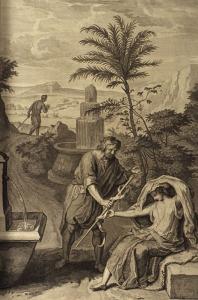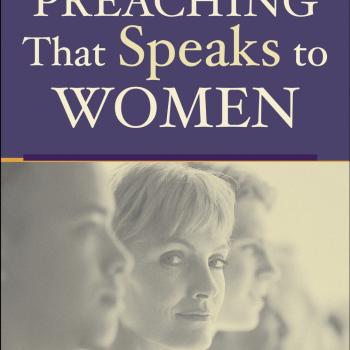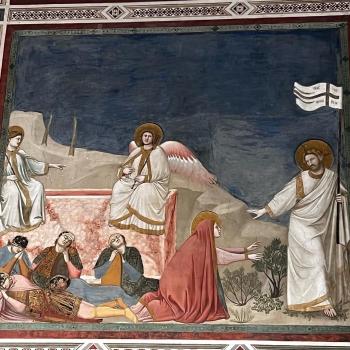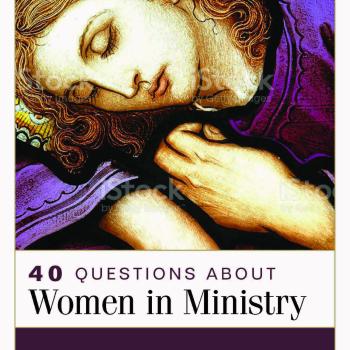
Advent approaches and, with it, my thoughts turn to the lineage of Christ. Who were those significant people listed in Matthew 1? And why were five women, specifically, mentioned by name? This post is the first in a series exploring the stories of those women—and the men paired with them.
The story of Judah and Tamar notoriously confounds preachers—how does Genesis 38 fit within the context of Joseph’s saga, chapters 37–50, and how can a story full of sexual sin and confusing culture be taught in “big church”? This lesson is not safe for the whole family.
But just because the topics are borderline—OK, full-on—risqué does not allow us to skip an important chapter that informs our understanding of both Israel’s founding family and their most famous descendant, Jesus. Judah and Tamar appear by name in the lineage of David (Ruth 4, 1 Chronicles 2:4) and of Jesus (Matthew 1:3), and in a world that generally ignored women the repetition of her name should make us take notice. What are we to learn from this unorthodox pair?
Biblical and Cultural Context
After the Flood, God narrowed his plan to bring a savior to the world by focusing on Abraham (Genesis 12). Four generations later, the twelve sons of Jacob arrive to carry on the covenant God made with Abraham and his descendants.
The world of Abraham, the Ancient Near East (ANE), was governed by two cultural realities:
- Patrilineage, “Father line”: The family line is traced through the father/son. We see this in Matthew 1. The practice remains common around the world, as seen in royal families up to recent decades, and women taking their husband’s family name, passing it along to their children.
- Patriarchy, “father rule”: the oldest male held authority over the family.
Of Jacob’s twelve sons, the oldest three, Reuben, Simeon, Levi, disqualified themselves from leading their generation (see Gen. 34, 35:21, and 49:4), so the fourth son, Judah, rose to become the leader of the brothers.
Enter Joseph, the eleventh son and most favored punk younger brother. His unwise sharing of dreams in which his older brothers bowed down to him, combined with his father playing favorites (coat of many colors, really?), led to his brothers’ great resentment. Let’s just say it—they hated him. In Genesis 37, Judah masterminds the selling of Joseph into slavery. The rest of Genesis, a total of 14 out of 50 chapters, chronicles Joseph’s story. I’ll let you read Genesis 39–42 on your own.
After Joseph is sold, Judah separates himself from the family and marries a Canaanite woman. Doing so was further evidence that his heart was hard towards the covenant and God of his father. Time goes on, and the famine brings the family together to seek food in Egypt, where they encounter the leader who mysteriously knows their birth order and asks a lot of questions about their home. He also keeps Simeon hostage until they bring their youngest brother with them on their next journey.
We pick up in chapter 43. Israel’s family is out of food again, and Judah is arguing with old Jacob that they must go back for more grain (and Simeon). In verses 8–9, Judah tells his father that he will be responsible for Benjamin, no matter what. He convinces Jacob, and the ten brothers go down to Egypt.
Now jump to the next scene with Joseph (44:27—34). Judah explains why his father will be devastated if they have to leave the youngest and how he objected to Benjamin even coming along.
What happened to Judah? In the years between selling one brother and being willing to lay down his life for his other brother, what clues does Scripture give for why he matured? To understand his growth, we must go back a few years to explore how deeply he sank.
Judah’s Downward Spiral
Chapter 38 interrupts Joseph’s story and returns attention to his vindictive older brother. Judah married, had three sons, and arranged his eldest’s marriage to Tamar, a local woman. “But Er, Judah’s firstborn, was wicked in the Lord’s sight; so the Lord put him to death” (38:7). Judah instructed his second son, Onan, “Sleep with your brother’s wife and fulfill your duty to her as a brother-in-law to raise up offspring for your brother” (v 8).
How could he give his widowed daughter-in-law to his other son? Remember, in patriarchy, women were property. They had no legal independence but were members of their husband’s households. Extended families lived under the patriarch’s rule—in this case, Judah led his sons’ households and was responsible for Tamar’s welfare.
Levirate marriage preserved a deceased’s man’s inheritance and memory. The practice was later codified into Hebrew law (Deut. 25:2–10). Such a marriage also offered benefits to the widow:
Protection: With Onan, Tamar remained in her home, had a place to live and food to eat within the family she already dwelt with.
Provision: With Onan, Tamar would ostensibly conceive children who not only carried on her dead husband’s name and inherited his portion, but also would hopefully grow up and be able to provide for her in later years. Children were 401Ks of that culture.
But Onan used Tamar for pleasure without fulfilling the demands of the law (Gen 38:9). And God was not pleased. So Onan died.
God cares about the poor, powerless, and broken: Tamar had no legal recourse. She was a powerless member of society. But God had systems in place to help provide for her. The men responsible to make that happen neglected and abused her instead.
Judah refused to give his youngest to Tamar, and as time passed, she figured out he had no intention of ever giving her to Shelah. So she hatched a plan to obtain what was legally and morally owed to her.
Carolyn Custis James, in her essay “Tamar: The Righteous Prostitute,” says:
Family honor compelled Tamar to act, coupled with a determination to right a wrong, for her own honor was at stake. . . The shame of Tamar’s childlessness will be intensified if her husband’s name dies out. Culturally she is honor-bound to fulfill this duty. Judah is standing in her way. (Vindicating the Vixens, Kregel 2017)*

Under Levirate law, Judah was the next eligible male in his family to carry on his own lineage. Tamar disguised herself as a prostitute, placed herself in his path, and he took the bait. Since he had no coin, she managed to get his staff, cord, and seal as surety—the equivalent of today’s social security card, driver’s license, and credit card. You flash these credentials and everyone knows who you’re talking about.
When word came that Tamar was pregnant, Judah saw a way out of his predicament. “Burn her!” (v 25). Such a response would free his youngest son to marry elsewhere and rid his family of the shame she had brought on them with this illegitimate child.
Double standard, anyone?
IRONY ALERT: For a guy so concerned with family honor, he wasn’t much concerned with acting honorably by fulfilling his obligations. Judah was all show, no substance.
Tamar produced Judah’s incriminating evidence: Recognize these? “I am pregnant by the man who owns these,” she said. And she added, “See if you recognize whose seal and cord and staff these are.”
Can you see her one raised eyebrow, arms folded, foot tapping? Can you hear the cold satisfaction in her voice?
Turning Point
Judah not only recognized his credentials; he recognized his culpability. When the truth hit him that his daughter-in-law had obtained the justice he, the one legally and morally responsible, had denied her, he admitted his guilt: “She is more righteous than I since I wouldn’t give her to my son Shelah” (v 26).
This is Judah’s turning point. If his life had resembled a stock market chart, it would have been on a steady decline until this point, where we see the “V-formation”—the arrow pointing down now reverses direction and begins climbing. From here on, Judah acts like the leader his family needs, a man of honor and trust.
God redeemed their situation with twins: one for each of Judah’s sons/Tamar’s husbands. Perez, the older, is the son through whom the line of David and Jesus would come. God’s covenant promises would not be thwarted.
A Man of Character
Let’s flip forward (again) to chapter 44, where Judah is pledging his life for Benjamin’s—for love of his father.
- The father he betrayed by selling Joseph and making him think he was dead.
- The father he ignored for years, whose covenant he turned away from for so long.
Now, he’s leading again. He’s matured. He’s become a force, a person much more aligned to God’s morality.
Pleading their case to Joseph, still unaware of his identity, Judah paints a picture:
“Your servant my father said to us, ‘You know that my wife bore me two sons. One of them went away from me, and I said, “He has surely been torn to pieces.” And I have not seen him since. If you take this one from me too and harm comes to him, you will bring my gray head down to the grave in misery.’
“So now, if the boy is not with us when I go back to your servant my father, and if my father, whose life is closely bound up with the boy’s life, sees that the boy isn’t there, he will die. Your servants will bring the gray head of our father down to the grave in sorrow. Your servant guaranteed the boy’s safety to my father. I said, ‘If I do not bring him back to you, I will bear the blame before you, my father, all my life!’
“Now then, please let your servant remain here as my lord’s slave in place of the boy, and let the boy return with his brothers. How can I go back to my father if the boy is not with me? No! Do not let me see the misery that would come on my father.” (Gen 44:27–34)
Judah is a changed man, and Joseph can see it. Notice the tests he had been putting his brothers through:
- Would they tell the truth about their family?
- Would they come back for Simeon?
- Would they return the money he put back in their bags?
- Would they bring Benjamin?
- Would they leave Benjamin even though it would destroy Jacob?
Dallas Seminary professor Dr. Sam Won, in a stellar Twitter thread, says of Joseph’s strategy:
He was able to discern not only if Judah had grown (he had), but also if Judah understood the damage he did (he did), and if Judah was willing to make things right at great cost (he was).
So What?
The narrative passages in Scripture are rich in truth and insight, but their lessons can be more difficult to discern and apply. Unlike the epistles with clear application points, stories teach principles, and different readers will tease out a variety of principles.
What do we learn from Judah?
I see in Judah a portrait of repentance. When confronted with evidence of his sin, he took the blame. He verbally vindicated Tamar then restored her to her rightful place in his household. This led him to become the kind of person who would sacrifice himself to spare his father more grief.
In what ways can we emulate him?
- Do we recognize the harm we’ve done?
- Are we willing to make things right, even at great cost?
- When confronted with our sin, how willing are we to admit it? What does it take for us to confess “I am the one!”
- Are we willing to give up our freedom, maybe our lives, in order to set things right and protect the Benjamins and Jacobs in the world?
What do we learn from Tamar?
- It takes courage to stand up for yourself—and the right way may not always look “nice,” so it also takes creativity.
- God is trustworthy. Nothing will thwart his plan. It’s always better to be in his will than against it.
- Even when we act righteously, others may misunderstand us. Though historically denigrated as a prostitute, Tamar is declared to be a righteous woman: In Ruth 4:12, 1 Chronicles 2:4, and Matthrew 1:3 she was noted by name in chronologies of Israel’s leaders (David/Jesus), and David named his daughter after her. She was a respected mother of Israel thanks to her extraordinary efforts to continue Judah’s line.
*I am indebted to Carolyn Custis James, whose brilliant research and writing on Genesis 38 have taught me much about its significance. I highly recommend her chapter in Vindicating the Vixens.












